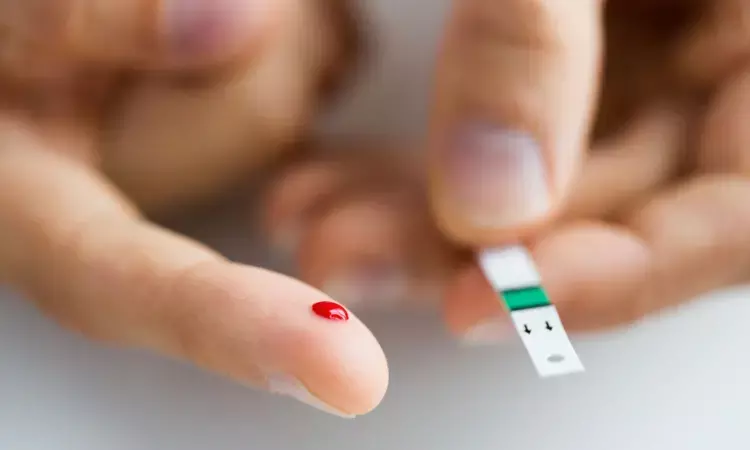- Home
- Medical news & Guidelines
- Anesthesiology
- Cardiology and CTVS
- Critical Care
- Dentistry
- Dermatology
- Diabetes and Endocrinology
- ENT
- Gastroenterology
- Medicine
- Nephrology
- Neurology
- Obstretics-Gynaecology
- Oncology
- Ophthalmology
- Orthopaedics
- Pediatrics-Neonatology
- Psychiatry
- Pulmonology
- Radiology
- Surgery
- Urology
- Laboratory Medicine
- Diet
- Nursing
- Paramedical
- Physiotherapy
- Health news
- Fact Check
- Bone Health Fact Check
- Brain Health Fact Check
- Cancer Related Fact Check
- Child Care Fact Check
- Dental and oral health fact check
- Diabetes and metabolic health fact check
- Diet and Nutrition Fact Check
- Eye and ENT Care Fact Check
- Fitness fact check
- Gut health fact check
- Heart health fact check
- Kidney health fact check
- Medical education fact check
- Men's health fact check
- Respiratory fact check
- Skin and hair care fact check
- Vaccine and Immunization fact check
- Women's health fact check
- AYUSH
- State News
- Andaman and Nicobar Islands
- Andhra Pradesh
- Arunachal Pradesh
- Assam
- Bihar
- Chandigarh
- Chattisgarh
- Dadra and Nagar Haveli
- Daman and Diu
- Delhi
- Goa
- Gujarat
- Haryana
- Himachal Pradesh
- Jammu & Kashmir
- Jharkhand
- Karnataka
- Kerala
- Ladakh
- Lakshadweep
- Madhya Pradesh
- Maharashtra
- Manipur
- Meghalaya
- Mizoram
- Nagaland
- Odisha
- Puducherry
- Punjab
- Rajasthan
- Sikkim
- Tamil Nadu
- Telangana
- Tripura
- Uttar Pradesh
- Uttrakhand
- West Bengal
- Medical Education
- Industry
Low glucose levels in T2D patients linked to masticatory inefficiency

A new study published in Public Library of Science suggests that poorly regulated blood glucose levels in type 2 diabetes patients were correlated with an increase in masticatory inefficiency brought on by weakened dental occlusion.
It has been established that mastication may help reduce the chance of developing diabetes, and occlusal support decreased that risk by enhancing glucose metabolism after meals. Uncertainty persists regarding the connection between poor mastication and blood glucose levels in people with type 2 diabetes (T2D). Therefore, Yeter Bayram and Mehmet Eskan carried out this prospective study to look at the relationship between blood glucose management in T2D patients and mastication inefficiency brought on by lower occlusal support.
In this study, 94 participants with a mean age of 54.9 years were included. Included were those who had been on T2D drugs for at least a year and had a medical history of T2D. There were two categories of subjects: Eichner group A (4 occlusal functional regions in the posterior area) was a part of the control group (41 patients). Eichner groups B (1-3 occlusal functional regions) and C (no natural occlusal contact) were included in the test group (53 participants). Participants in the control group had blood glucose levels that were significantly lower than those in the test group. Patients who needed a fixed restoration and displayed decreased or absent occlusal support were treated with an implant-supported fixed restoration. The independent student t-test was used to compare the glycated hemoglobin (A1c) concentrations in these groups.
The key findings of this study were:
1. In comparison to the test group (9.42), the control group's blood glucose level was considerably lower (7.48).
2. There were 1.94 0.39 mean differences between the two groups.
3. Body mass index (BMI) and white blood cell counts did not differ across groups in a statistically meaningful way.
4. In T2D patients with decreased occlusal support, blood glucose levels may drop (from A1c 9.1 to 6.2) after a fixed implant-supported repair.
Reference:
Bayram, Y. E., & Eskan, M. A. (2023). Mastication inefficiency due to diminished or lack of occlusal support is associated with increased blood glucose levels in patients with type 2 diabetes. In G. Isola (Ed.), PLOS ONE (Vol. 18, Issue 4, p. e0284319). Public Library of Science (PLoS). https://doi.org/10.1371/journal.pone.0284319
Neuroscience Masters graduate
Jacinthlyn Sylvia, a Neuroscience Master's graduate from Chennai has worked extensively in deciphering the neurobiology of cognition and motor control in aging. She also has spread-out exposure to Neurosurgery from her Bachelor’s. She is currently involved in active Neuro-Oncology research. She is an upcoming neuroscientist with a fiery passion for writing. Her news cover at Medical Dialogues feature recent discoveries and updates from the healthcare and biomedical research fields. She can be reached at editorial@medicaldialogues.in
Dr Kamal Kant Kohli-MBBS, DTCD- a chest specialist with more than 30 years of practice and a flair for writing clinical articles, Dr Kamal Kant Kohli joined Medical Dialogues as a Chief Editor of Medical News. Besides writing articles, as an editor, he proofreads and verifies all the medical content published on Medical Dialogues including those coming from journals, studies,medical conferences,guidelines etc. Email: drkohli@medicaldialogues.in. Contact no. 011-43720751


